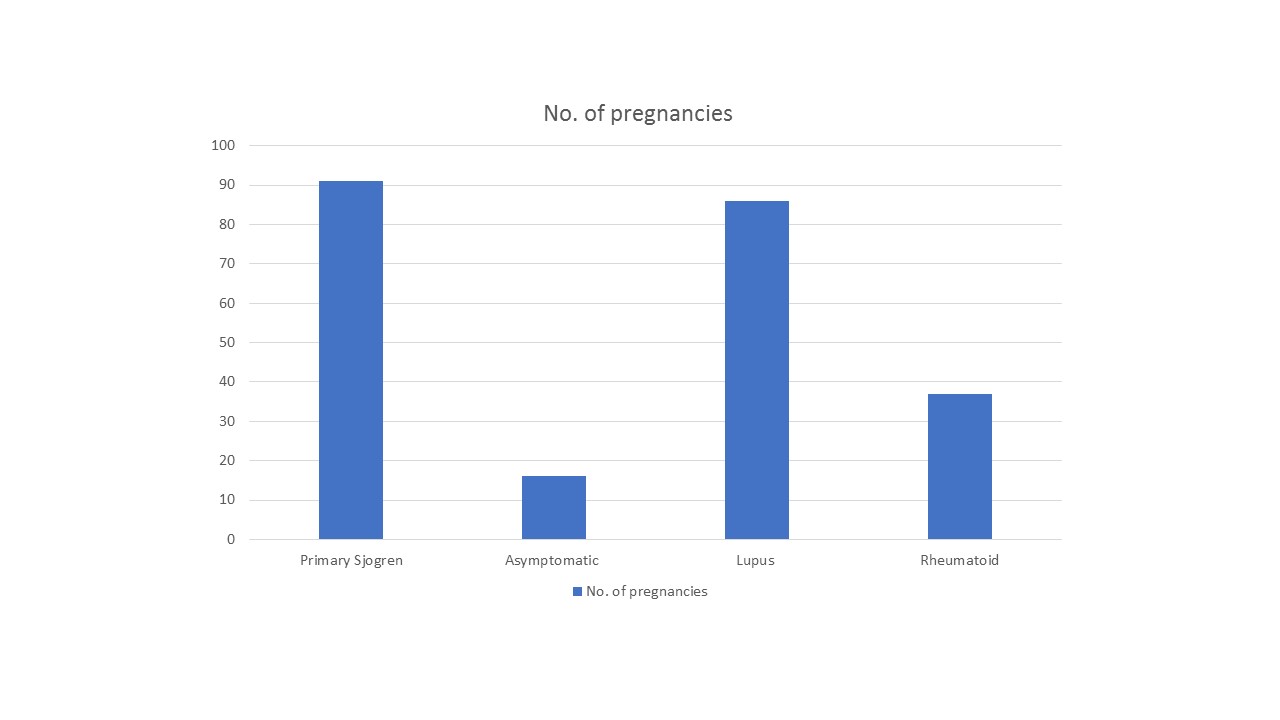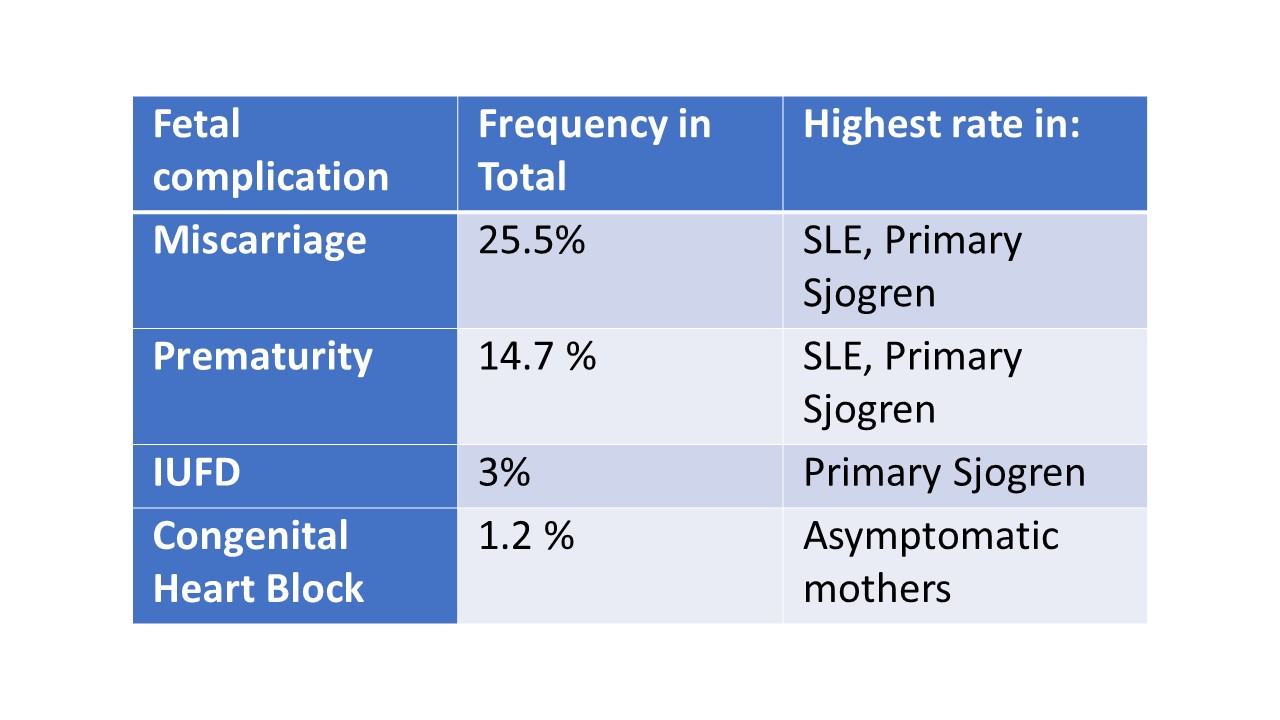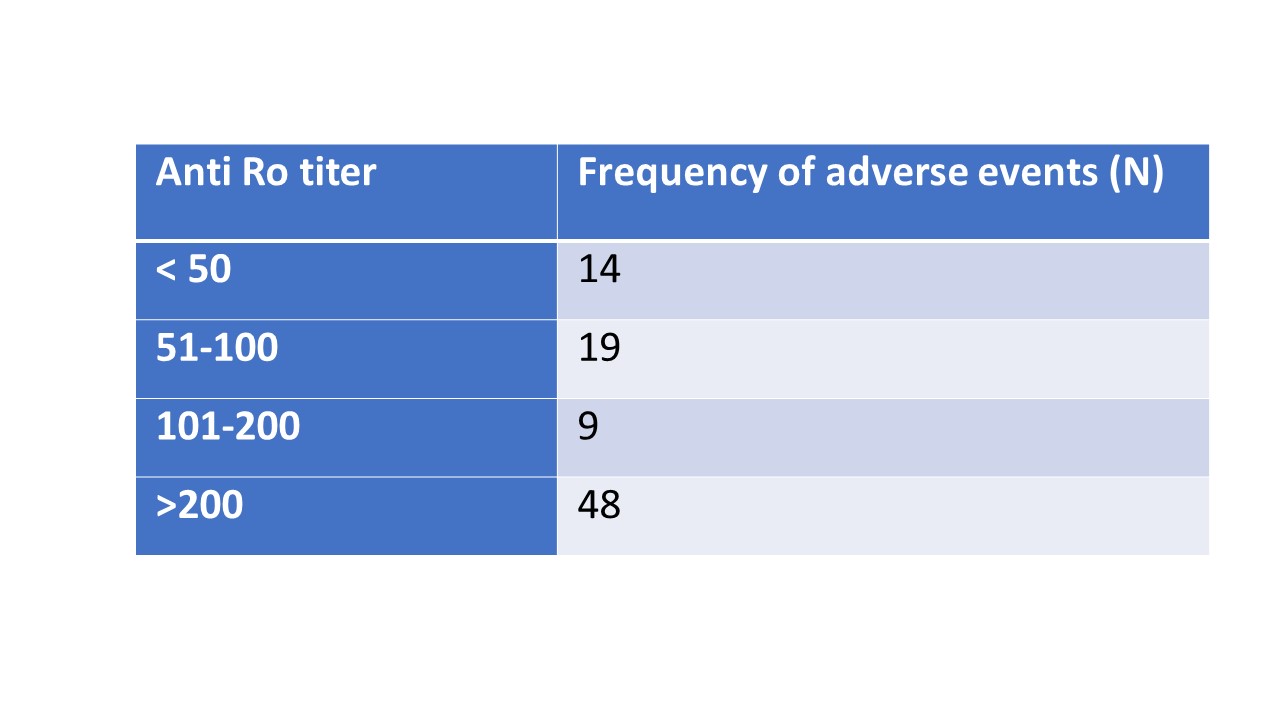Session Information
Date: Sunday, November 8, 2020
Title: Sjögren’s Syndrome Poster
Session Type: Poster Session C
Session Time: 9:00AM-11:00AM
Background/Purpose: Anti-Ro antibody positivity is linked to adverse fetal outcomes like congenital heart block CHB (2%) and neonatal lupus. The incidence of CHB increases to 6-13% with subsequent pregnancies.
These antibodies are present in cases of primary Sjogren, SLE, Rheumatoid as well as asymptomatic population. It’s unclear if the virulence of these antibodies is linked to the underlying disease.
Many asymptomatic women are identified retrospectively after having a baby with Congenital Heart block.
The purpose of this study is to describe the impact of anti-Ro positivity on the pregnancy outcome and it’s relation to the underlying maternal disease.
Methods: We retrospectively collected data from a specialized Pregnancy and Rheumatic Disease clinic at the largest tertiary hospital in Qatar. We targeted this clinic due to the standardized approach and treatment.
All cases with anti-Ro positivity were included and stratified according to the underlying disease. The analysis was performed using SPSS software.
Results: We identified 231 pregnancies of 62 mothers from our records between 2017-2020.
One hundred and sixteen pregnancies occurred after the diagnosis.
Disease Stratification: Primary Sjogren (92 pregnancies), SLE(86 pregnancies), Rheumatoid (37 pregnancies), and Asymptomatic (16 pregnancies). Chart 1.
Adverse outcomes: eleven pregnancies (4.8%) were complicated by pre-eclampsia, while (6.5%) had gestational diabetes.
Fetal adverse events: Miscarriage was the most prominent (25.5%), followed by prematurity (4.7%), then IUFD (3%). These adverse events occurred more frequently in patients with SLE and primary Sjogren (Table 1).
Asymptomatic anti-Ro positivity and congenital heart block: CHB occurred in 3 asymptomatic cases. Two of them required permanent pacemaker and 1 developed transient bradycardia.
These Asymptomatic women had 11 healthy pregnancies in total before this event. And 2 of them had healthy pregnancies on hydroxychloroquine after their babies with CHB.
No cases of CHB were identified among the other diseases.
Hydroxychloroquine role: HCQ was used in 94 pregnancies as treatment of the underlying diagnosis. None of them developed CHB, and it was associated with a lower rate of miscarriages.
Anti-Ro titer (u/ml): Sixty women out of 62 were tested at least once for anti-Ro titer. Fetal adverse events were more frequent in patients with high titers. (Table 2).
Anti-La antibodies tested positive in 12 patients only (titer range: 14-320 u/ml).
Conclusion: In this study, we observed low incidence of congenital heart block in general. Interestingly, it happened only in asymptomatic women with high antibody titer.
Miscarriage and IUFD were more frequent than CHB in patients with Primary Sjogren.
Hydroxychloroquine was associated with a lower frequency of fetal adverse events.
 Chart 1: Number of pregnancies per Rheumatic diseases.
Chart 1: Number of pregnancies per Rheumatic diseases.
 Table1: Adverse Fetal Outcomes
Table1: Adverse Fetal Outcomes
 Table 2: Anti- Ro titer (u/ml) in relation to the rate of adverse fetal outcomes.
Table 2: Anti- Ro titer (u/ml) in relation to the rate of adverse fetal outcomes.
To cite this abstract in AMA style:
Satti E, Hadwan N, Ashour H, Saleh R, Alam F, Alsaed O, Al Emadi S. The Impact of Anti-Ro Antibodies on the Pregnancy Outcome in Relation to Maternal Disease Presentation: A Descriptive Analysis of 231 Pregnancies [abstract]. Arthritis Rheumatol. 2020; 72 (suppl 10). https://acrabstracts.org/abstract/the-impact-of-anti-ro-antibodies-on-the-pregnancy-outcome-in-relation-to-maternal-disease-presentation-a-descriptive-analysis-of-231-pregnancies/. Accessed .« Back to ACR Convergence 2020
ACR Meeting Abstracts - https://acrabstracts.org/abstract/the-impact-of-anti-ro-antibodies-on-the-pregnancy-outcome-in-relation-to-maternal-disease-presentation-a-descriptive-analysis-of-231-pregnancies/
